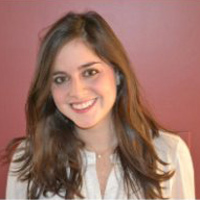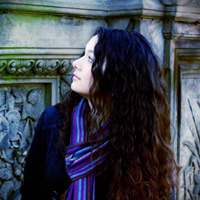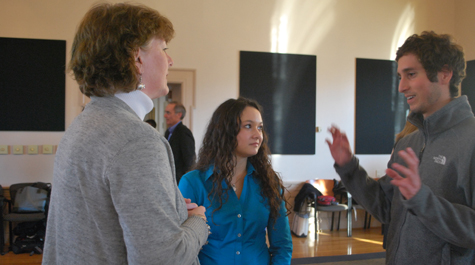Sharp-Pulitzer collaboration produces strong journalism
Eight William & Mary students, the 2012-13 participants in the Sharp Writer-in-Residence Program's collaboration with the Pulitzer Center on Crisis Reporting, recently celebrated their journalistic accomplishments at a reception sponsored by the Roy R. Charles Center, which facilitated the partnership between the Sharp program and the Pulitzer Center two years ago. There was much in which to find pride and joy.
Their subjects were varied, from the increasing importance political parties place on social media, to the global perception of Che Guevara, 46 years after his assassination, to the unforeseen complications of Spain’s attempt, 521 years after exiling Sephardic Jews, to offer them citizenship.
Their writing was crisp and evocative. For example:
“When the police began charging, he did what everyone else did – he ran,” Aly Brahe ’14 wrote in “The Crackdown,” the story of a Spanish teen’s unexpected journey from protestor to a symbol of free expression. “Trailing behind him were six police officers. When the first blow landed on his back, it stripped him of his balance and propelled him forward. Stunned, he scrambled up again, only to catch another blow to his back. Instinctively, indignantly, Yago turned midstride to face his attacker, whose right arm was cocked above his head. It was the last thing Yago saw.” Their reporting was often bold and always topical: the problems immigrants face assimilating in “El Nuevo South;” school garden programs and food sustainability; Bosnia’s preparation for its first post-war census; and the clash between an American Indian nation on the Arizona border and the illegal immigrants who use their land to enter the U.S.
Their reporting was often bold and always topical: the problems immigrants face assimilating in “El Nuevo South;” school garden programs and food sustainability; Bosnia’s preparation for its first post-war census; and the clash between an American Indian nation on the Arizona border and the illegal immigrants who use their land to enter the U.S. Among those joining in the festivities were Barry ’81 and Anne Sharp ’82, whose gift to the university helped expand an embryonic relationship with the Pulitzer Center; Ann Peters, Pulitzer Center director of development and outreach; and Jina Moore, a Pulitzer grantee and one of two reporters who mentored the students through their projects.
Among those joining in the festivities were Barry ’81 and Anne Sharp ’82, whose gift to the university helped expand an embryonic relationship with the Pulitzer Center; Ann Peters, Pulitzer Center director of development and outreach; and Jina Moore, a Pulitzer grantee and one of two reporters who mentored the students through their projects. “The students were involved with topics found in their subject area,” said Joel Schwartz, director of the Charles Center, “but also topics that everyone should have an interest in.”
“The students were involved with topics found in their subject area,” said Joel Schwartz, director of the Charles Center, “but also topics that everyone should have an interest in.”
Under the guidance of their journalist mentors, the students developed compelling stories based on their academic interests and learned how to explain these issues to a broader audience. The mentors came to Williamsburg three times in a little more than a semester, in September, October and then for  an intensive three-day workshop in January. Afterwards communication was mostly by e-mails and Skype, and the discussions ranged from determining a lead paragraph to plotting strategy for getting through to an important source of information.
an intensive three-day workshop in January. Afterwards communication was mostly by e-mails and Skype, and the discussions ranged from determining a lead paragraph to plotting strategy for getting through to an important source of information.
“I thought they were all really terrific,” Moore said. “We ask a lot of them, from ‘I know nothing about journalism’ to final piece. Some of the stories, I didn’t know how we were going to get there, but they stuck with it and did some very creative sourcing.” Allyson Zacharoff ’13, author of “Spain Rights the Wrong of Jewish Exile?” has spent a large part of her undergraduate career researching antisemitism in Spain, and is writing her current senior thesis on the treatment of Jews under Francisco Franco’s regime (1939-75).
Allyson Zacharoff ’13, author of “Spain Rights the Wrong of Jewish Exile?” has spent a large part of her undergraduate career researching antisemitism in Spain, and is writing her current senior thesis on the treatment of Jews under Francisco Franco’s regime (1939-75).
For this story, she interviewed individuals in academia in Spain, as well as Sephardic Jews in the United States, an official from the nonpartisan fact tank Pew Research Center and academics in the U.S. She also managed to gain access to a key document from the Spanish Consulate in New York City.  “I am always shocked and disheartened to learn that antisemitism is not only a European thing of the past, but still exists there even today,” she said. “But people in the U.S., especially, do not always realize just how large a role it still plays on that continent. So I wanted to share this with a broader American audience in order to bring awareness to a topic about which I feel very passionate."
“I am always shocked and disheartened to learn that antisemitism is not only a European thing of the past, but still exists there even today,” she said. “But people in the U.S., especially, do not always realize just how large a role it still plays on that continent. So I wanted to share this with a broader American audience in order to bring awareness to a topic about which I feel very passionate." Max Lander ’13, who wrote an untitled piece primarily on the status of school gardening projects in Cape Town, South Africa, spent 10 weeks in Cape Town after receiving a grant from W&M to do research on food security. When he returned home, he contacted the United Nations’ Food and Agriculture Organization and its World Food Program to gain the international perspective.
Max Lander ’13, who wrote an untitled piece primarily on the status of school gardening projects in Cape Town, South Africa, spent 10 weeks in Cape Town after receiving a grant from W&M to do research on food security. When he returned home, he contacted the United Nations’ Food and Agriculture Organization and its World Food Program to gain the international perspective.
“The course gave me the opportunity to really tell a story, to say, ‘We really need to look at this as a global community,’" Lander said. “Every line I wrote, I spent time saying, ‘Is this fair?’ The course taught me the difference between good journalism and bad journalism.”
















